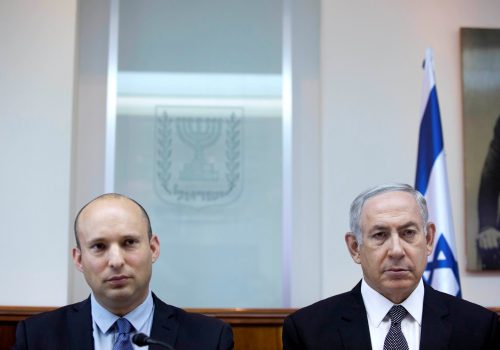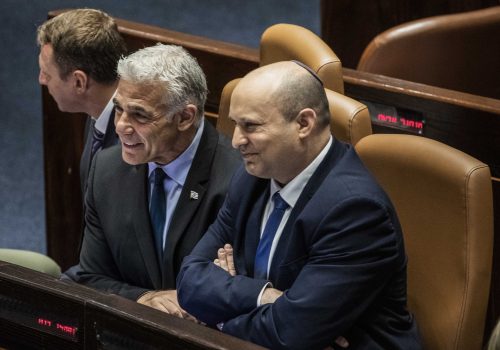Iran’s new demands to revive the nuclear deal are a sigh of relief for Israel. Here’s why.
In early September, a sigh of relief could be heard all over Jerusalem coming from the Israeli Prime Minister’s Office. The relief was over Iran’s response to the Joe Biden administration’s latest proposal in the ongoing negotiations to restore the Joint Comprehensive Plan of Action (JCPOA). President Biden rejected Iran’s key demands and refused to back down. With comments from Israeli officials asserting that “the Iranians demanded too much” and “they derailed the talks,” Prime Minister Yair Lapid and Defense Minister Benny Gantz claimed success.
But it was a completely different picture just four weeks earlier. At that time, behind closed doors, Israeli officials told me, “the truth is that we have less than a 50 percent chance to prevent the United States [from] saying ‘yes’ to a new nuclear deal.” At that time, in early August, the prevailing impression was that a deal was just a matter of days away. The European Union’s (EU) Josep Borrell and Enrique Mora offered the Iranians a last-chance draft proposal. Iran’s first reply—and the Biden administration’s positive response to it—led many observers to conclude it was just a matter of time. However, as August turned to September, Washington was flooded with Israeli officials trying to prevent a possible deal: National Security Adviser Eyal Hulata, Israeli Defense Minister Gantz, Mossad Director David Barnea, and others all made the trip within a matter of days.
Meanwhile, Israel found itself in the opening phase of a hard-fought election campaign between three people who see themselves as the next prime minister: Lapid, Gantz, and former prime minister, Benjamin Netanyahu. While two are from the current coalition and the third leads the opposition, all three oppose the Iran deal, which they believe is bad for Israel.
But politics is politics. A nuclear deal being signed at this stage would be very bad news for Lapid and Gantz. When the deal seemed imminent, even Lapid’s partner, alternate Prime Minister Naftali Bennett, tried to distance himself from the failure, issuing a statement saying, “I managed to prevent the deal for one year, and I hope that also now it will be possible to prevent it.” In other words, if there’s a deal, it’s the fault of the current prime minister.
Netanyahu, who has spent over a decade fighting a nuclear deal between the United States and Iran, seized the political opportunity: “They failed,” he thundered. “Iran will achieve a bomb on Lapid and Gantz’s watch.” He attacked the government for not coming out publicly against the Biden administration, notwithstanding that his use of that tactic back in 2015, when he delivered his speech to Congress opposing the deal, failed miserably.
Leaving no opportunity unexploited, Netanyahu even agreed to meet with Lapid to get a briefing on the nuclear talks (these days, a meeting between the prime minister and the head of the opposition to discuss national security matters, once standard practice, is now rare). However, Netanyahu’s purpose was clear. As soon as he left the meeting, Netanyahu attacked the government’s Iran policy.
The other side, fearing that they would lose the political battle, tried a different tack. An unnamed very senior Israeli official convened Israeli diplomatic reporters for a briefing and explained: “Even if the United States and Iran say ‘yes’ and a deal is signed, then Israel still has 160 days until the implementation of the deal to try to prevent it from coming into effect.” In other words, even if an agreement is signed before November 1— Israeli election day—it should not count as the Israeli government’s failure, because implementation would not take place until months later—if at all. While the briefing was provided to diplomatic correspondents, it was really intended for the ears of political correspondents.
Despite the genuine Israeli fear of a deal and its political implications, the talks bogged down again as Iran pressed for guarantees of future sanctions relief and an end to the International Atomic Energy Agency’s (IAEA) investigations of its undeclared nuclear sites. As President Biden has long rejected these demands, the consensus flipped overnight to the conclusion that a deal will not be signed before the US midterm elections on November 8—conveniently one week after the Israeli election. Some argue that there is now a high likelihood that a deal will not be signed at all.
With this reversal, the Israeli government took a victory lap. “We managed to stop the nuclear deal with Iran,” said Lapid in a speech in which he presented his party list for the upcoming elections. Lapid added: “As opposed to Netanyahu, we did it without ruining our relations with the US administration.” Recalling the visits in Washington, Israeli officials claim that Israel presented the Biden administration new intelligence regarding Iran’s nuclear activity and pressured them to not give in to Iran’s renewed demands regarding closing the IAEA investigations on Iran’s undeclared nuclear activities. Furthermore, Israeli officials assert that they persuaded the Biden administration against giving Iran guarantees and compensation if a future administration pulls the United States out of the deal again.
The Israelis know very well that these Iranian demands were impossible to meet. On sanctions relief, President Biden cannot make commitments for a future American president. As for the IAEA investigations, even the Europeans—not to mention the IAEA, whose job is to investigate nuclear activities—oppose giving Iran sanctions relief without better Iranian cooperation.
Perhaps Israel’s intervention did influence the views of the Biden administration, or perhaps the new intelligence they presented made the White House less inclined to believe Iran would comply with a renewed nuclear deal. But, in Jerusalem, Israeli officials also know this truth: if Iran had said “yes” to the EU’s final draft proposal offer, even Israel’s best arguments could not have prevented a deal. And that would not have just influenced Israel’s security, but may have reshaped the current political campaign.
Amichai Stein is diplomatic correspondent for Israel’s Kann 11 News. Follow him on Twitter: @AmichaiStein1.
Further reading
Thu, Jun 9, 2022
Israel, guess who’s back? Netanyahu is back again.
MENASource By
Yes, Israel might go, once again, to an early election, the fifth since 2019.
Wed, Jul 6, 2022
There’s uncertainty in Israel and within the Palestinian Authority. The US’s stabilizing role is critical more than ever.
MENASource By Ksenia Svetlova
When China and Russia are keen to deepen their influence in the Middle East and American allies in the region are doubtful about the future, it is up to the United States to provide the stability and firmness that is lacking in today’s regional landscape.
Wed, Jul 13, 2022
Biden is visiting Israel. Travel is squarely on the agenda.
MENASource By
One lesser-known element of Washington’s alliance with Israel will be squarely on US President Joe Biden’s agenda: Israel’s long-running quest to join America’s visa waiver program.
Image: U.S. President Joe Biden, Israeli Defence Minister Benny Gantz and Israeli caretaker Prime Minister Yair Lapid tour Israel's defence system at Ben Gurion Airport, near Tel Aviv, Israel, July 13, 2022. Gil Cohen-Magen/Pool via REUTERS


